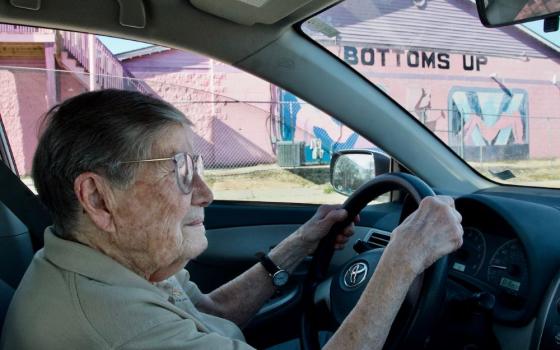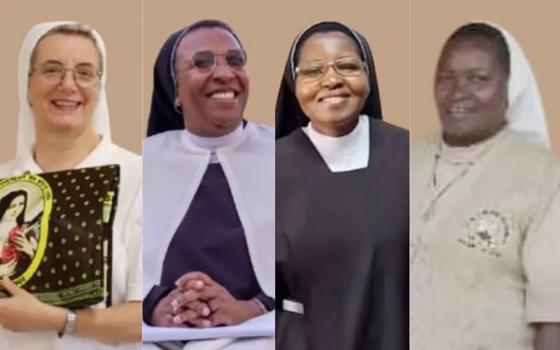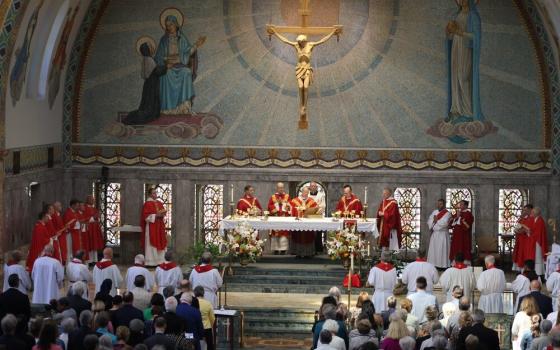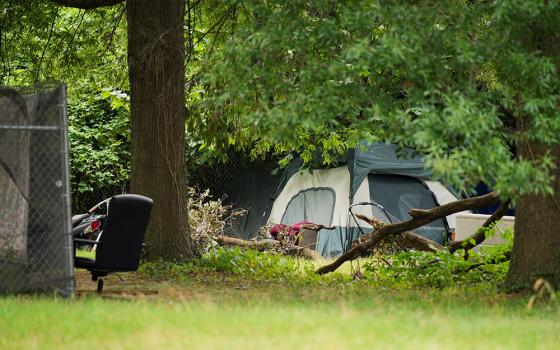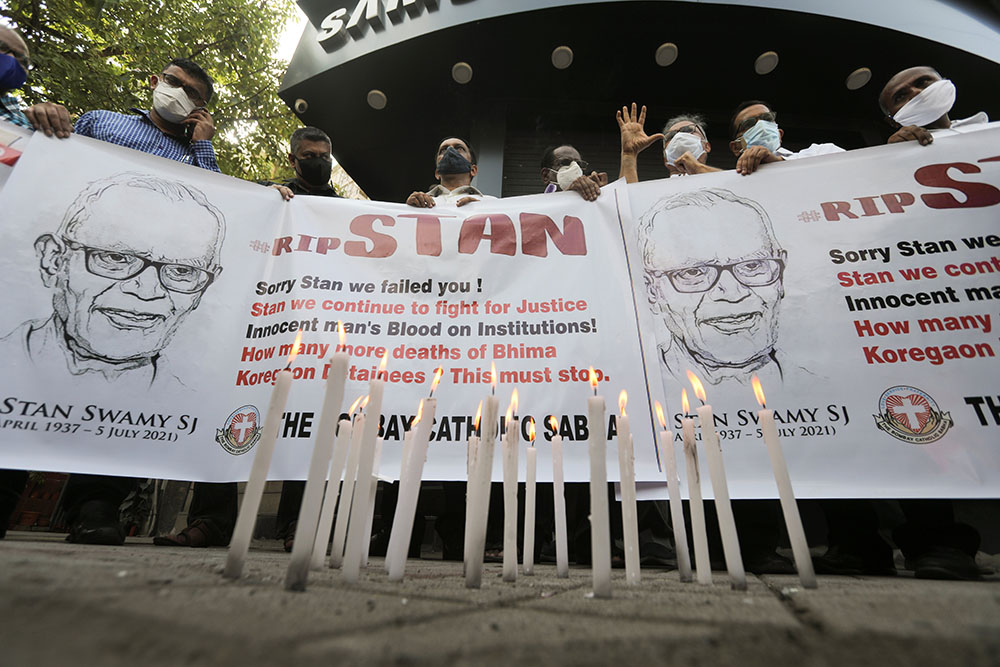
People hold a banner during a July 6 prayer service for Jesuit Fr. Stan Swamy in Mumbai, India, the day after he died at a hospital. (CNS/Reuters/Francis Mascarenhas)
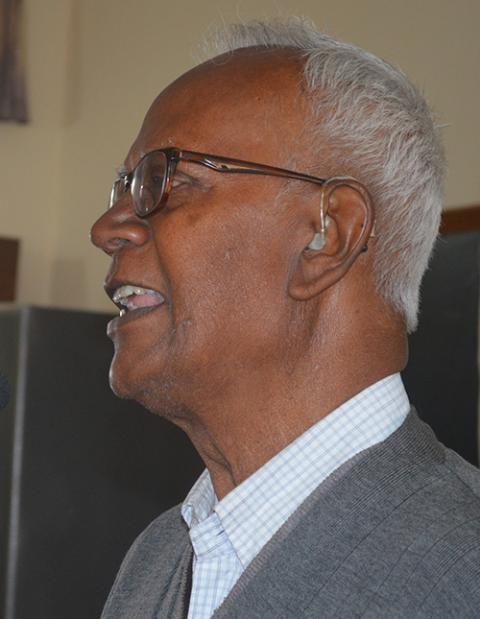
Jesuit Fr. Stan Swamy addresses a 2018 meeting of the Forum of Religious for Justice and Peace, an advocacy group for Catholic priests, brothers and sisters. (Courtesy of Manju Kulapuram)
An octogenarian Jesuit human rights defender who died in July while in custody for alleged terrorist activities has emerged as the new icon for Catholic religious in India.
Fr. Stanislaus Lourduswamy, popularly called Stan Swamy, died July 5 in a Catholic hospital in Mumbai, western India, where he was brought 38 days beforehand from a jail for treatment of multiple illnesses, including COVID-19.
The 84-year-old Jesuit had "identified with the poor tribal and Dalit communities who were victims of structural injustice, says human rights activist Sr. Sujata Jena, who in 2016 attended a convention on Right to Food that Swamy organized at his base of Ranchi, capital of Jharkhand state in eastern India. "He worked relentlessly to ensure justice for them and died in judicial custody without getting justice for himself."
Swamy "has challenged Catholic religious in India with his life and work. They can no more remain in their comfort zone after he sacrificed his life for the poor and marginalized," states Jena, a member of the Congregation of the Sacred Hearts of Jesus and Mary who is based in Bhubaneswar, capital of the eastern Indian state of Odisha.
The "real tribute" the Catholic religious can offer Swamy is to recommit to serve the poor and oppressed, she told Global Sisters Report. "Many oppressed by the system are languishing in jails." (Jena is a GSR columnist and panelist on The Life, a forum of sisters whose views are published monthly in GSR.)
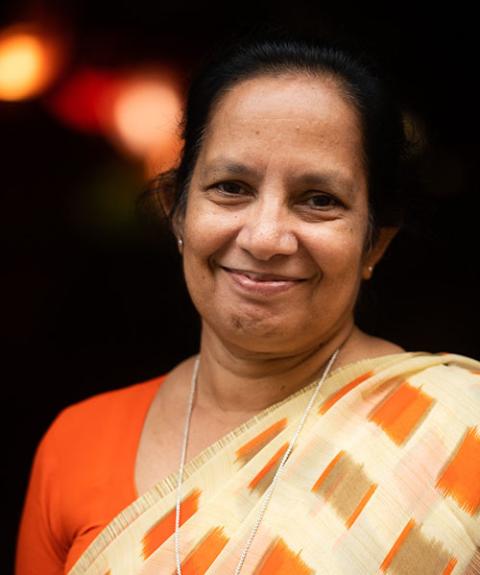
Presentation Sr. Shalini Mulackal, a professor at Delhi's Vidyajyoti Theology College, was an associate of Jesuit Fr. Stan Swamy. (Courtesy of Shalini Mulackal)
Presentation Sr. Shalini Mulackal, a theology professor in New Delhi, says of Swamy, "He is the Indian version of St. Óscar Romero," a bishop who was killed in 1980 for speaking out against social injustice and violence in El Salvador and canonized as a saint in 2018.
Mulackal had first met Swamy in 1978 as a novice while attending an exposure program he conducted at the Indian Social Institute in Bangalore (now Bengaluru).
Swamy's "stand for justice and for the poor and the way he was ready to pay the price has inspired many, not only in India, but all over the world. His death was not in vain," Mulackal told GSR.
Sr. Robancy A. Helen, an activist in Tamil Nadu, Swamy's native state in southern India, says the Jesuit "has become an inspiration for all those who wish to live for others."
Swamy was arrested Oct. 8, 2020, by the National Investigation Agency, India's counterterrorist task force, at his residence in Ranchi for alleged terrorist activities, including a plot to assassinate Prime Minister Narendra Modi. He was taken the same night to Mumbai, some 1,060 miles southwest, and a court there sent him to jail the next day.
Swamy was the oldest Indian arrested under the Unlawful Activities Prevention Act, India's primary counterterrorism law that many call draconian.
Swamy was the last of 16 writers, academics, lawyers, students and activists arrested by national agents in what is called the Bhima-Koregaon case. The police suspected them to be Maoists, a banned radical left-wing group that instigated the 2018 violence during a Dalit celebration at Bhima-Koregaon, a village near Pune town southeast of Mumbai in Maharashtra state. The 2018 event was the bicentennial of a battle seen as a historic victory by a British Army dominated by Dalits, the lowest level in India's caste system.
Advertisement
A few days before his arrest, Swamy had released a video in which he narrated how detectives had questioned him for 15 hours over five days in July 2020. The interrogators had produced "some extracts" allegedly taken from his computer to prove his links with Maoists. Swamy dismissed them as "fabrications" that were "stealthily" put into his computer.
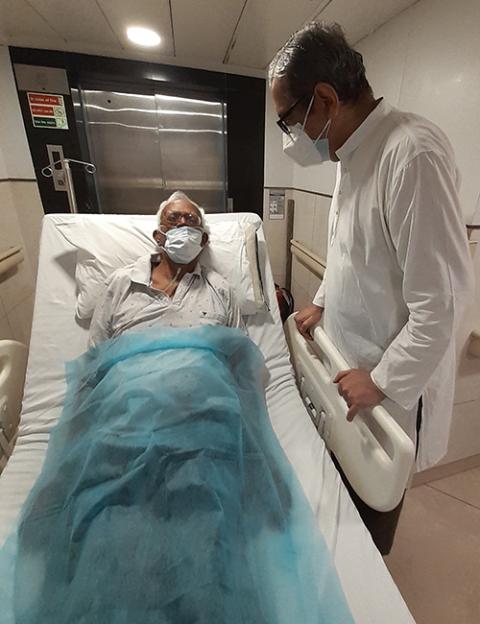
Jesuit Fr. Stan Swamy lies in his hospital bed in Holy Family Hospital, Mumbai, western India. His visitor is Fr. Frazer Mascarenhas, the only Jesuit that Swamy was allowed to see during nine months of incarceration. (Courtesy of Frazer Mascarenhas)
"Neither the police nor the agency that arrested Swamy could produce evidences to prove his alleged crimes," says Helen, a member of the Religious Institute of Christ the Redeemer, Idente Missionaries.
She cites recent media reports that support Swamy's suspicion. Arsenal Consulting, a United States-based computer forensics firm, has found that the computers of two accused in the Bhima-Koregaon case were hacked using malicious software to plant incriminating letters later used as primary evidence against them.
Swamy ended the video with some awareness about what might unfold in the dissent against India's ruling party, saying, "I'm happy to be a part of this process because I'm not a silent spectator but I'm part of the game. I'm ready to pay the price, whatever be it."
Swamy's death spurred an unprecedented outpouring of grief and condemnation from across the globe, including from the United Nations.
Among those condemning Swamy's death in custody was Mary Lawlor, the U.N. special rapporteur on human rights defenders, who on July 15 warned that the incident would tarnish India's human rights record.
India's External Affairs Ministry rebutted the criticisms and claimed Swamy was arrested "following due process under law." A ministry spokesperson told reporters July 6 that the courts had rejected Swamy's bail applications because of the specific nature of charges against him.
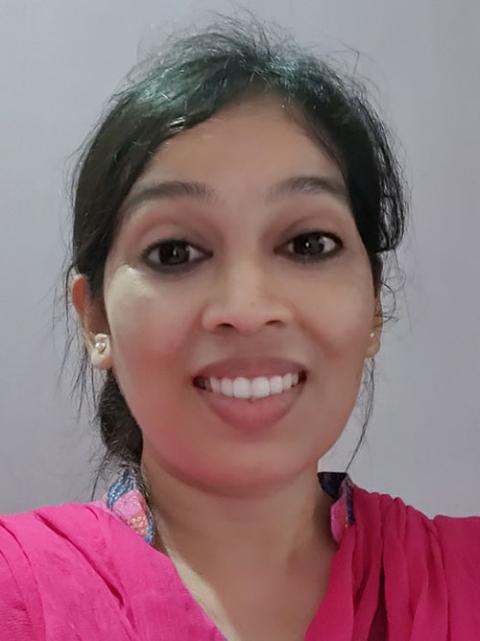
Sr. Sujata Jena, a member of the Congregation of the Sacred Hearts of Jesus and Mary, met Jesuit Fr. Stan Swamy in 2016 at a Right to Food Convention in Ranchi, capital of Jharkhand state in eastern India. She had taken about 300 Dalit and tribal women from neighboring Odisha state for the convention. (Courtesy of Sujata Jena)
Swamy was exposed to tribal exploitation in 1965, when as a seminarian of Jamshedpur Jesuit Province he taught tribal students at St. Xavier's High School in Lupungutu village near Chaibasa in Jharkhand's West Singhbhum district, which is rich in iron ore. In a 2018 interview with online outlet The Wire, Swamy recalled helplessly watching the agents of outside lenders and businessmen as they swindled goods and land from the local tribal people, whose cultural practice has been to give back to nature, always leaving some fruit on the trees for the birds.
Since 1991, Swamy worked with the Jharkhand Organization for Human Rights, a nongovernmental organization opposing displacement of tribal communities, also known as the Adivasis, because of development projects.
In 2000, he set up Bagaicha, a research institute near Ranchi. Swamy organized local youth and helped them understand their issues — land alienation and displacement caused by mining, dams and other development projects implemented without the people's consent.
India's mining lobby and corporate firms are accused of indiscriminate exploitation of Jharkhand, one of the richest mineral zones in the world. It accounts for 40% of the mineral and 29% of the coal reserves in India.
As local resistance grew, the administration jailed hundreds of young people in 2014 and 2015. Swamy formed the Persecuted Prisoners Solidarity Committee and planned counterstrategies with social and human rights activists and civic organizations. He filed a case in the Jharkhand High Court, seeking information on pretrial detainees, mostly tribals.
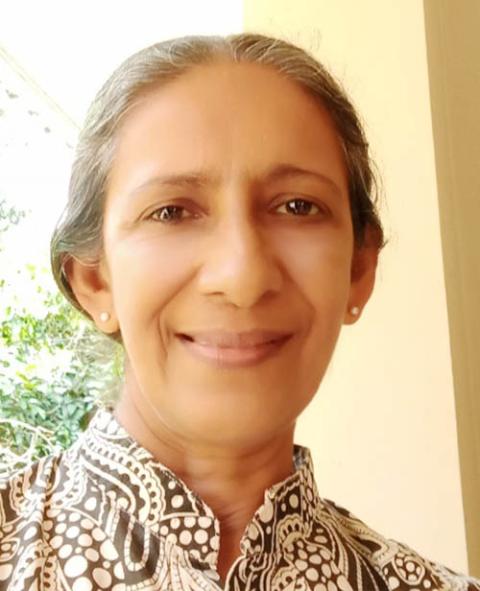
Kochurani Abraham, a lay theologian and member of the Indian Christian Women's Movement, likens Jesuit Fr. Stan Swamy's death in July to that of Jesus, saying both were victims of the clash of religious and political forces in their times. (Courtesy of Kochurani Abraham)
Such works are cited as a reason for the Hindu nationalist Bharatiya Janata Party's defeat in the Jharkhand legislative assembly elections in 2019. The Bhima-Koregaon case then gave Swamy's opponents an excuse to target him.
Mulackal holds the Indian government and the country's judicial system responsible for Swamy's death as a pretrial detainee. "Even though he was allowed to go to a hospital for treatment at the end, and died there, it was a custodial death," the theologian told GSR.
While Helen says Swamy "was murdered for doing the will of God," Holy Cross Sr. Manju Kulapuram, national secretary of the Forum of Religious for Justice and Peace who knew Swamy when she worked in Jharkhand, concludes that "vested interests" got rid of Swamy to grab the tribal lands without resistance and offer them to the corporations.
Kochurani Abraham, a laywoman theologian, says the "unholy" political-corporate nexus eliminated Swamy as his "integrity and prophetic voice" had threatened their "exclusive development plans," just as "Jesus was eliminated by the tie-up between the religious and political powers of his times."
Jesuit Fr. P.A. Chacko, a Swamy associate who has served the church in Jharkhand for the past five decades, says his elder confrere had "stuck his neck out to walk with the downtrodden" and paid the price with his life.
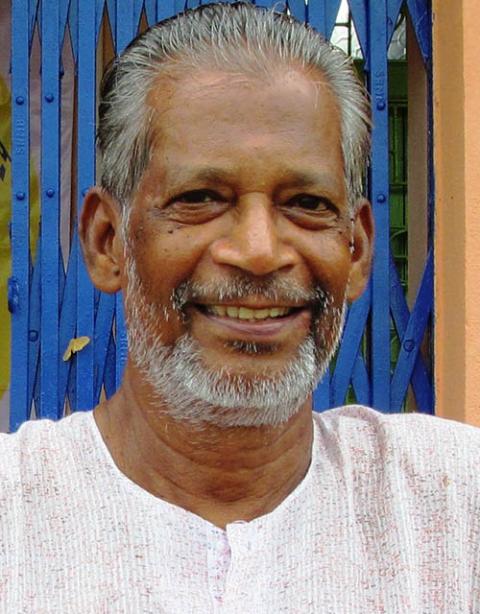
Jesuit Fr. P.A. Chacko, a missionary in the eastern Indian state of Jharkhand, where Jesuit Fr. Stan Swamy worked among tribal communities (Courtesy of P.A. Chacko)
Chacko admits that no Jesuit in India has gone this far until now.
"Most of us looked at him from the sidelines with our own reservations. Some of us admired him from a safe distance. It was his lay friends and the many in the civil society who believed what he said and did," Chacko said.
Some Catholic leaders want the church immediately to declare Swamy a martyr, a potentially speedier route to sainthood.
Mumbai-based Redemptorist Fr. Ivel Mendanha, who called for Swamy's canonization during a Sunday sermon on July 11, says most Indians came to know about Swamy's life and work after his arrest. "They felt for him, they prayed for him, and they were inspired by his unflinching commitment to living the Gospel," Mendanha told GSR.
If Swamy "is not a saint, who is?" asks social activist Claretian Fr. George Kannanthanam, arguing that the Jesuit sacrificed his life for the causes for which Jesus lived and died.
However, Kulapuram pleads that the church not put Swamy on a pedestal. Instead, she urges it should follow "the spirituality of Jesus of Nazareth" that Swamy promoted to bring great changes among the marginalized.
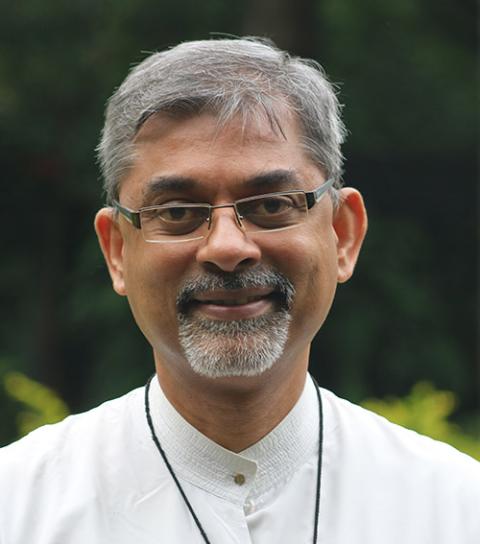
Fr. Ivel Mendanha, vice provincial of the Redemptorists' Mumbai, India-based Majella province, has called for canonization of Jesuit Fr. Stan Swamy. (Courtesy of Ivel Mendanha)
Helen says Swamy's courage to fight injustice until the end was "mind-blowing." His prophetic voice, she predicts, will help many advocates for justice to rise from the oppressed communities.
Sr. Joel Urumpil, a member of the Sisters of Charity of Nazareth who works in Jharkhand, says her life changed totally after attending Swamy's classes in Bangalore in the late 1980s. She describes herself until then as "a pious person" who was "bandaging wounds," inculcated by the church's rules and teachings that sanctified service without analysis and worshipped "a false Jesus who was meek, humble, obedient, and ready to die for the suffering humanity but never questioned [injustice]."
Swamy helped Urumpil's class "escape age-old practices that prevented them from getting involved with marginalized people for systematic change." She added that he was "embarrassingly open to letting the students question authority, rules and rubrics, and even the existence of God."
Mulackal says Swamy's training programs had "a transformative impact" on the participants. "They became very conscious and critical of the socioeconomic and political situation of our country. Some even left religious life or priesthood because of their strong conviction."
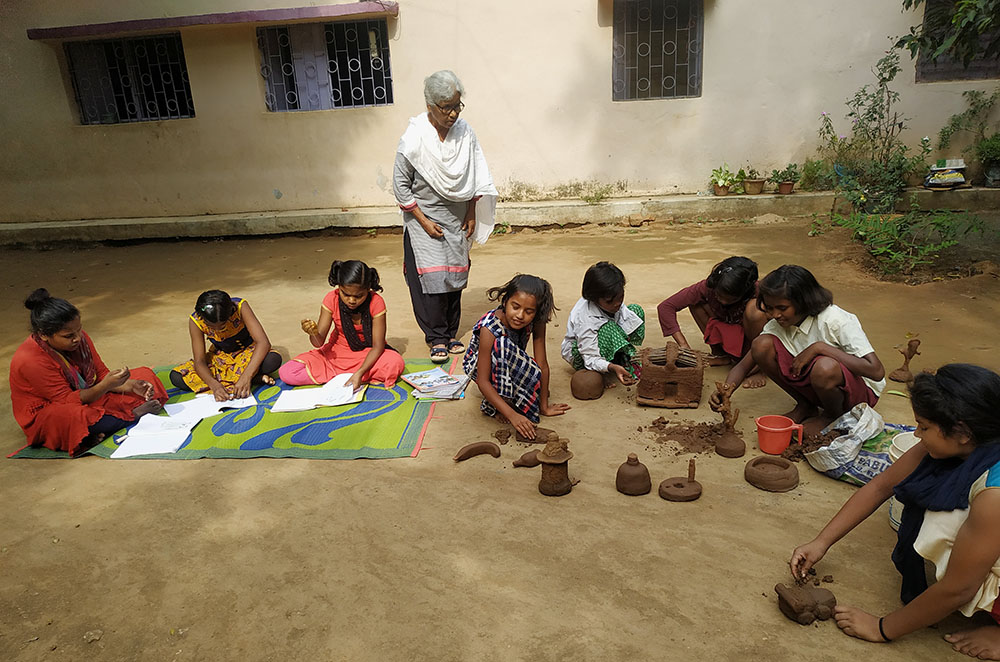
Sr. Joel Urumpil, a member of the Sisters of Charity of Nazareth and a former student of Jesuit tribal activist Fr. Stan Swamy, works with tribal children at Chatra in the Jharkhand state of eastern India. (Courtesy of Joel Urumpil)
Swamy encouraged those he trained to be proactive in the Indian church's efforts to assist impoverished people, Mulackal says. "In the late '70s and '80s, many religious congregations opened houses in rural areas and city slums to work for and with the poor."
"He could have been a professor or principal of a reputed Jesuit-run college," says social worker Sr. Ekta Ekka, a tribal from Jharkhand and a Franciscan Sister of Our Lady of Graces based in the northern Indian Diocese of Meerut.
"Instead, he lived among Adivasis and fought for their constitutional rights for the past 50 years."

